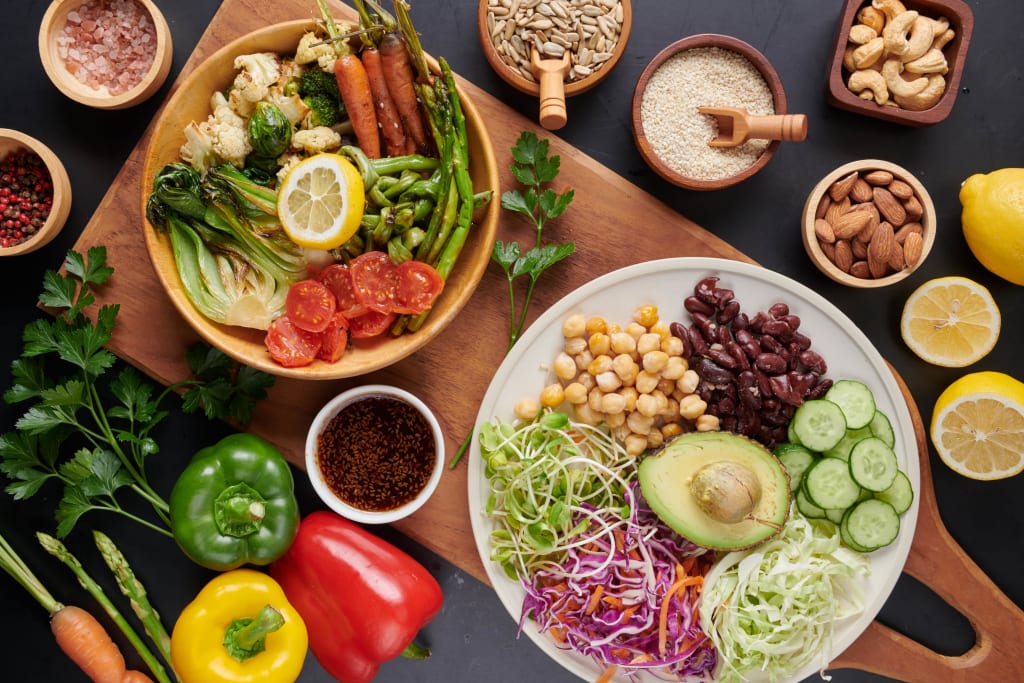
What is vegan diet? and why?
A vegan diet is a type of plant-based diet that avoids all animal products. People choose to go vegan for various reasons, including ethical treatment of animals, concern for the environment, health benefits, weight management, and personal beliefs. A well-planned vegan diet can provide all the necessary nutrients and may offer advantages such as improved heart health, better blood sugar control, and reduced risk of certain cancers. It's important to find a diet that aligns with your personal values and beliefs for a healthy and fulfilling lifestyle.
Benefits for going vegan
Weight loss: A well-planned vegan diet can lead to weight loss as it is typically lower in calories and fat, and higher in fiber and nutrients than a meat-based diet.
Improved heart health: Vegan diets have been shown to lower blood pressure, improve cholesterol levels, and reduce the risk of heart disease.
Better blood sugar control: A vegan diet has been shown to help improve insulin sensitivity and lower blood sugar levels, making it a helpful option for those with or at risk for type 2 diabetes.
Reduced cancer risk: Some studies suggest that a vegan diet may be associated with a lower risk of certain types of cancer, such as breast and colon cancer.
Improved gut health: A vegan diet can promote a healthy gut microbiome and improve digestive function, as it is high in fiber and low in saturated fat.
Get your latest vegan cook book!
Is a vegan diet healthy?
A well-planned vegan diet can be a healthy and nutritionally adequate option for people of all ages. It can provide all the essential nutrients needed for good health and may offer various health benefits, such as improved heart health, better blood sugar control, and a reduced risk of certain cancers. However, a vegan diet may also have some potential drawbacks if it is not carefully planned. For example, a vegan diet may lack certain nutrients, such as vitamin B12 and omega-3 fatty acids, which are typically found in animal products. It's important to make sure that a vegan diet includes a variety of foods that provide all the necessary nutrients. Consultation with a healthcare professional or a registered dietitian can be helpful in ensuring a balanced and nutritious vegan diet.
Can you build muscles on a vegan diet?
Yes, it is possible to build muscle on a vegan diet. With proper planning, a vegan diet can provide all the necessary nutrients for muscle growth and recovery, including protein, carbohydrates, and healthy fats. Plant-based protein sources, such as legumes, tofu, tempeh, and seitan, can help to support muscle growth and repair. Additionally, it's important to engage in regular resistance exercise, such as weightlifting or bodyweight exercises, to stimulate muscle growth. To optimize muscle growth, it may also be helpful to consume adequate calories and track protein intake to ensure that enough protein is being consumed to support muscle growth. Consulting with a registered dietitian or a healthcare professional can be helpful in designing a balanced and nutritious vegan diet for muscle building.
What are the options for a healthy vegan diet?
Whole grains: Whole grains, such as brown rice, quinoa, and whole wheat bread, provide fiber, complex carbohydrates, and other essential nutrients.
Legumes: Legumes, such as beans, lentils, and chickpeas, are a great source of protein and fiber, as well as vitamins and minerals like iron and potassium.
Nuts and seeds: Nuts and seeds, such as almonds, chia seeds, and flaxseeds, are high in healthy fats, protein, and fiber, and can be a great addition to a vegan diet.
Fruits and vegetables: Fruits and vegetables are essential for a balanced vegan diet, as they provide a wide range of vitamins, minerals, and antioxidants.
Plant-based milk alternatives: Plant-based milk alternatives, such as almond milk, soy milk, and oat milk, can be a good source of calcium, protein, and other nutrients.
Tofu and tempeh: Tofu and tempeh are made from soybeans and are high in protein, making them a great alternative to animal-based protein sources.
Fortified foods: Some fortified foods, such as plant-based milks and breakfast cereals, can be a good source of vitamin B12, which is typically found in animal products.
Remember, it's important to have a well-planned and varied diet to ensure that all the essential nutrients are consumed. Because of that, you should get your own vegan, plant-based diet cook book here.





Comments
There are no comments for this story
Be the first to respond and start the conversation.